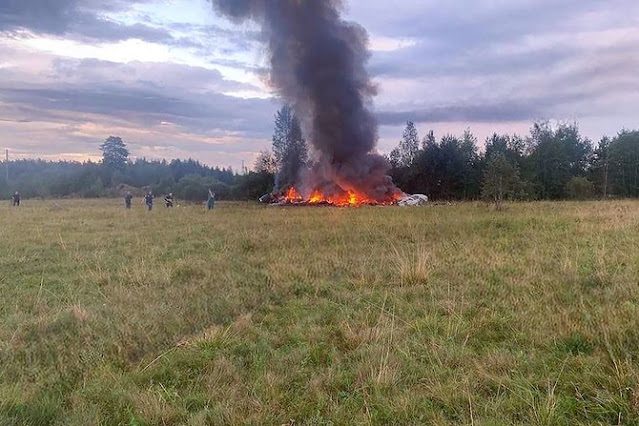A plane crash near Moscow has plunged the fate of Yevgeny Prigozhin, a prominent mercenary leader who led a brief armed rebellion against the Russian military earlier this year, into uncertainty. All 10 individuals on board the plane lost their lives in the crash, including Prigozhin.
Prigozhin's presence on the ill-fated flight was confirmed by Russia's civil aviation agency, which cited information from the airline. The crash has ignited suspicions due to the previous speculation surrounding the founder of the Wagner private military company, whose actions sparked intense debate.
When Prigozhin orchestrated the rebellion, President Vladimir Putin condemned it as an act of "treason" and a "stab in the back," vowing retaliation. However, charges against him were eventually dropped. The Wagner chief, known for leading formidable forces during Russia's involvement in Ukraine, was allowed to retreat to Belarus and occasionally reemerged in Russia.
The plane crash coincides with reports in Russian media about the dismissal of a high-ranking general linked to Prigozhin from his position as air force commander.
The crash involved a plane en route from Moscow to St. Petersburg, which went down around 300 kilometers north of the capital, as reported by Russia's state news agency Tass. Russia's civilian aviation agency, Rosaviatsia, promptly confirmed Prigozhin's presence on the flight, as per the airline's records.
Notably, experts including Keir Giles from the international affairs think tank Chatham House have cautioned against hastily accepting reports of Prigozhin's death. Giles emphasized that individuals have been known to adopt the name Yevgeniy Prigozhin in order to obscure their movements.
Flight tracking data analyzed by The Associated Press revealed that a private jet previously associated with Prigozhin took off from Moscow and suddenly lost its transponder signal shortly after departure. The abrupt signal interruption occurred while the aircraft was at altitude and traveling at speed. Images circulated on social media linked to Wagner displayed burning wreckage with a partial tail number resembling the one used by Prigozhin's jet.
Videos shared by the pro-Wagner Telegram channel Grey Zone depicted the plane plummeting from a cloud of smoke, spiraling uncontrollably as it descended. This pattern can indicate severe aircraft damage or explosion mid-flight. The videos seemed to indicate a missing wing from the aircraft.
Russian authorities have initiated an investigation into the crash based on air safety rule violations. Emergency officials reported that all 10 bodies were recovered from the crash site.
Although Prigozhin's death, if confirmed, may not significantly impact Russia's conflict in Ukraine, where his forces were prominent players, its circumstances are likely to be perceived as a form of vengeance by the Kremlin. Analysts speculate that Putin and the Russian security apparatus would view Prigozhin's demise as a lesson for potential followers. Prigozhin's post-rebellion activities were seen as a concern by the authorities, and his passing might be seen as a resolution to that concern.
Tatiana Stanovaya, a senior fellow at the Carnegie Russia Eurasia Center, noted that public response to Prigozhin's death might be subdued due to a mix of fear among his supporters and a perception of his fate as deserved. The intricate web of speculation and intrigue surrounding Prigozhin's activities and his ultimate demise continues to capture attention and raise questions about the true nature of events.

